Punishing All Things Russian for Putin’s Crimes
The moral and historical illiteracy of boycotting Russian identity and culture
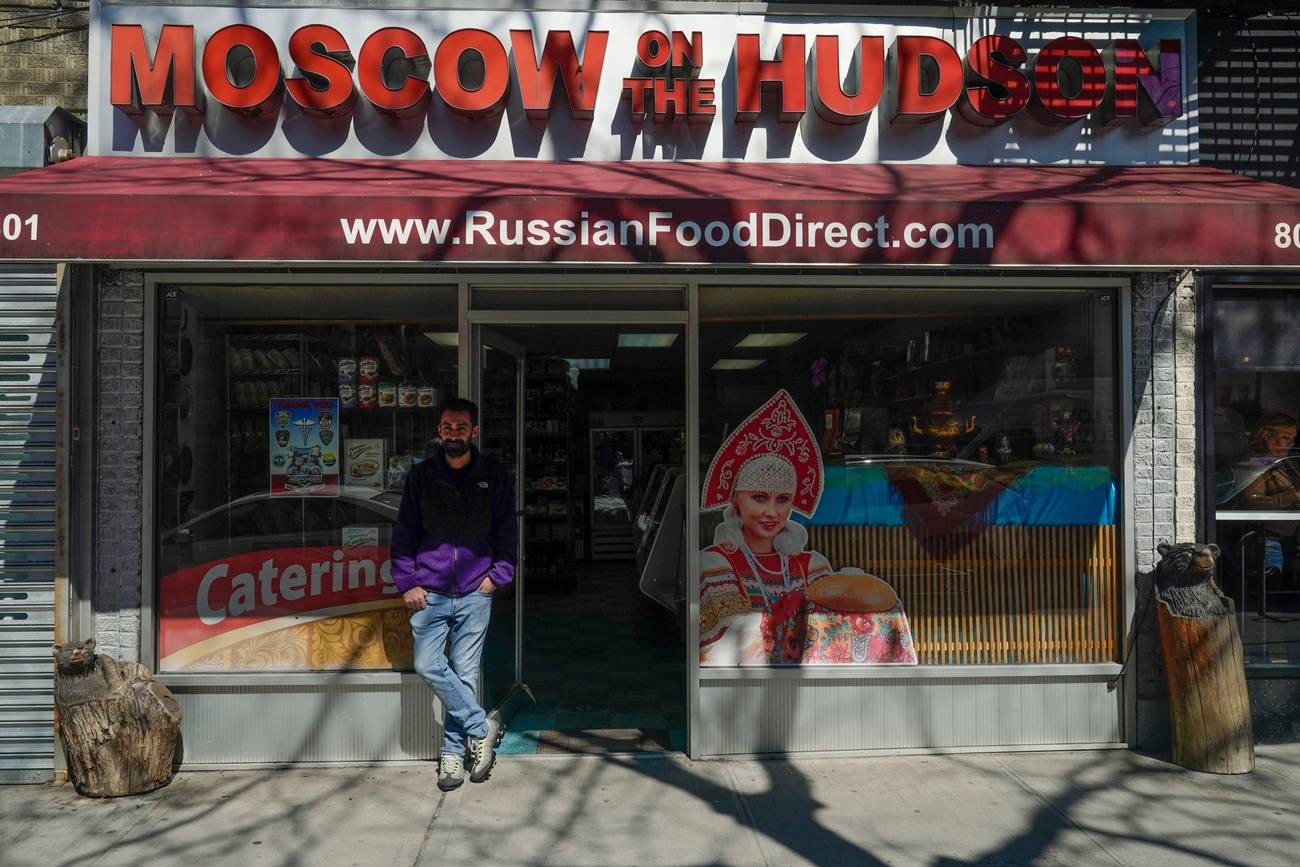


When my parents and I left Moscow on June 7, 1987, we also left behind our Soviet citizenship. Former refuseniks, we came to the West as stateless refugees. Our Russianness was not measured by passports or identification papers, but by our native language and the baggage of Russian culture we carried with us to exile. After three and a half decades in America, I continue to claim and practice “Russianness” in my various dimensions: as a son, husband, and father; as a bilingual author and son of a Jewish Russian writer; as an American and Israeli citizen; as a teacher of Russian-language authors; as a descendent of Ukrainian and Lithuanian Jews who were killed by bullet in the occupied Soviet territories.
In my immigrant American years, I have only occasionally encountered anti-Russian sentiments directed at me. They usually came from “meathead” types, in whose minds “Soviet-Russian-Communist” formed a straight arrow of enemy offense. “Go back to Russia, Maxim. You don’t belong here,” a cook at a restaurant where I worked told me in the summer of 1988. Such occasional hostility was so atypical that I used to brush it off like a thistle. Never before the outbreak of the war in Ukraine have I observed such an omnipresent, pervasive urge to place an identity (Russian identity) under the yoke of collective responsibility—for Russia’s war in Ukraine—or to reject an identity because of a stereotypical perception based on its worst representatives: Putin and his henchmen and executioners. When Russia’s villainous ruler sends his troops to murder a neighboring country, it falls to the world to stop him and to protect Ukraine. When Russian identity is targeted for vilification, it falls to Russian expatriates and students of Russian culture and history to explain to the world why wholesale rejection of “Russianness” does not help stop the carnage in Ukraine or topple Putin’s regime.
Every day for the past four weeks, I have been poring over news dispatches from Ukraine and the coverage of the broadening opposition to Russia’s aggression. Every day I text—and several times a week, speak—with friends in Russia. I am also in contact with friends and colleagues in Ukraine, in Kyiv and Odessa. I have made a point of starting every class I teach with a brief discussion of the situation in Ukraine—the first major war to enter the daily lives of today’s college students. I also take the daily temperature of the local atmosphere in Boston by asking my teenage daughters and my octogenarian parents what their peers are talking about in connection with Ukraine’s patriotic war.
On the second day of the war, my younger daughter Tatiana, who is in eighth grade, shared with us at dinner that a teacher told the entire class, “The Russians attacked Ukraine.” Refusenik blood pulsing in her veins, Tatiana gently corrected the teacher: Russia’s troops; Putin’s regime attacked Ukraine. At Brookline High School, where my older daughter Mira is a sophomore, she knows a number of kids, the majority of them Jewish, who used to identify as “Russian.” These are predominantly boys and girls whose Russian-speaking parents were born in the former USSR. At the same time, both of my daughters have first-generation classmates who have always identified as “Ukrainian.” Russia’s invasion of Ukraine has put a crack in the “Russianness” of some of my daughters’ classmates. One of them has a Russian-speaking mother who came from Gomel, Belarus; another’s Russian-speaking parents came from Riga, Latvia. The family of one of my daughter’s good friends hails from Moldova (the former Bessarabia) and had lived in Israel before coming to the United States. Mira also told me about another Jewish classmate whose parents had come from Ukraine when they were in their teens. The classmate used to identify as “Russian” but now speaks of herself as “Ukrainian.”
The “Russian” kids with parents from places now outside the Russian Federation can retreat into the safety of other national identities and become, say, “Moldovan,” or “Latvian,” but kids with a father or a mother from Moscow or St. Petersburg could only retreat into the anonymity of origins by obfuscating their family’s past. My wife, Karen, whose ancestors come from Lithuania and North Bukovina (which is now in Ukraine)—and later from South Africa and Colombia—was born in Philadelphia. How unlikely is a scenario in which my daughters have to worry about disclosing the place of their father’s birth? I do not know. But I have definitely heard of elderly immigrants from the former USSR who now worry, fairly or not, that they could be in for the kind of treatment that Japanese Americans suffered after Pearl Harbor. I have waved off this talk as dystopian while also knowing full well that Japanese Americans who had been interned in America during World War II might understand this new Russian-American anxiety. A Ukrainian-born 46-year-old immigrant who came to the United States as a small child recently summarized this anxiety to a reporter: “I don’t want to be called Russian anymore.”
I have compiled a collection of boycotts, rejections, and banishments directed against bearers of Russian identity in its various ethnic, national, political, linguistic, or cultural manifestations. I call this portfolio “from FIDE to FIFe.” Soon after the start of Russia’s invasion, FIDE, the International Chess Federation, forbade Russian (and Belarusian) chess players from competing under their nation’s flags and introduced disciplinary measures against chess masters directly implicated in supporting Putin’s regime. FIFe, the International Cat Federation, used the following language against Russian-bred cats and cats with Russian passports: “No cat bred in Russia may be imported and registered in any FIFe pedigree book outside Russia, regardless of, which organization issued its pedigree. No cat belonging to exhibitors living in Russia may be entered at any FIFe show outside Russia, regardless of, which organization these exhibitors hold their membership in.” It is difficult not to wonder about the meaning of banning identity-bound cats from competitions. Siberian cats? Russian blues? Cats with Russian bloodlines? Russian cats in exile?
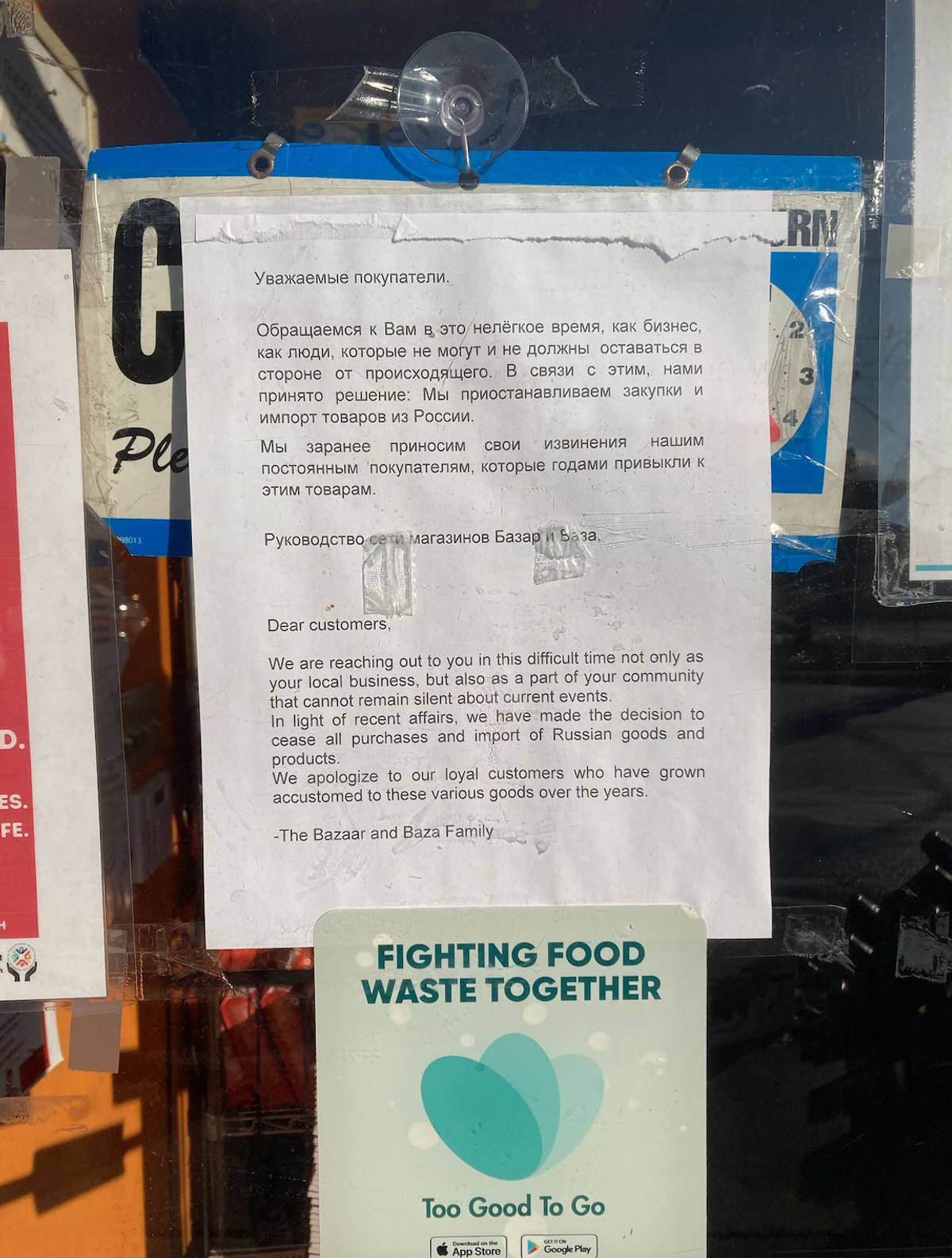
Here’s a sampling of the local, national, and international items from the portfolio I have assembled. Some of the measures were introduced by the owners and proprietors of businesses established by émigrés from the former USSR and commonly known as “Russian”—even though they carry products from a number of former Soviet republics, Eastern and Central Europe, and Turkey as well as provisions made in the United States and Canada. At Bazaar International, the grocery store in Brookline, Massachusetts, where I have been shopping for over 25 years, bilingual flyers on the door and at the deli counter inform the customers: “In light of recent events we have made the decision to cease all purchases and import of Russian goods and products.” (In the Russian-language version, instead of “to cease” it says something closer “to suspend.”) Café St. Petersburg and Petropol Russian Bookstore, both of them pillars of the Boston-area, ex-Soviet, largely Jewish community, have received threatening messages as well as calls from self-abnegating expatriates wanting nothing more to do with Russia.
And then there is the story of the Russian School of Mathematics (RSM), a successful network of K-12 after-school and summer programs now educating about 40,000 students in many states. RSM was founded in 1997 in the Boston area by two Jewish women from the former USSR, the Belarusian-born Inessa Rifkin and the Ukrainian-born Irina Khavinson. Both of my daughters have taken math at our local branch in Brookline, and I admire RSM and its teaching philosophy. RSM put out a statement on the war in Ukraine that amounts to a defense of its name and raison d’être: “We are an American company, and we pride ourselves on being a company of immigrants. […] We ask the greater RSM community to remember that regardless of their country of origin, no one is responsible for this war but Putin and his regime. Many ask about the ‘Russian’ in our school’s name. We named our school to reflect the historic tradition of Russian mathematics that we all share. This is a tradition that predates Russia’s current government and will exist long after it.” A bitter irony: to emigrate to America as Soviet Jews and now to feel ostracized as “Russian.”
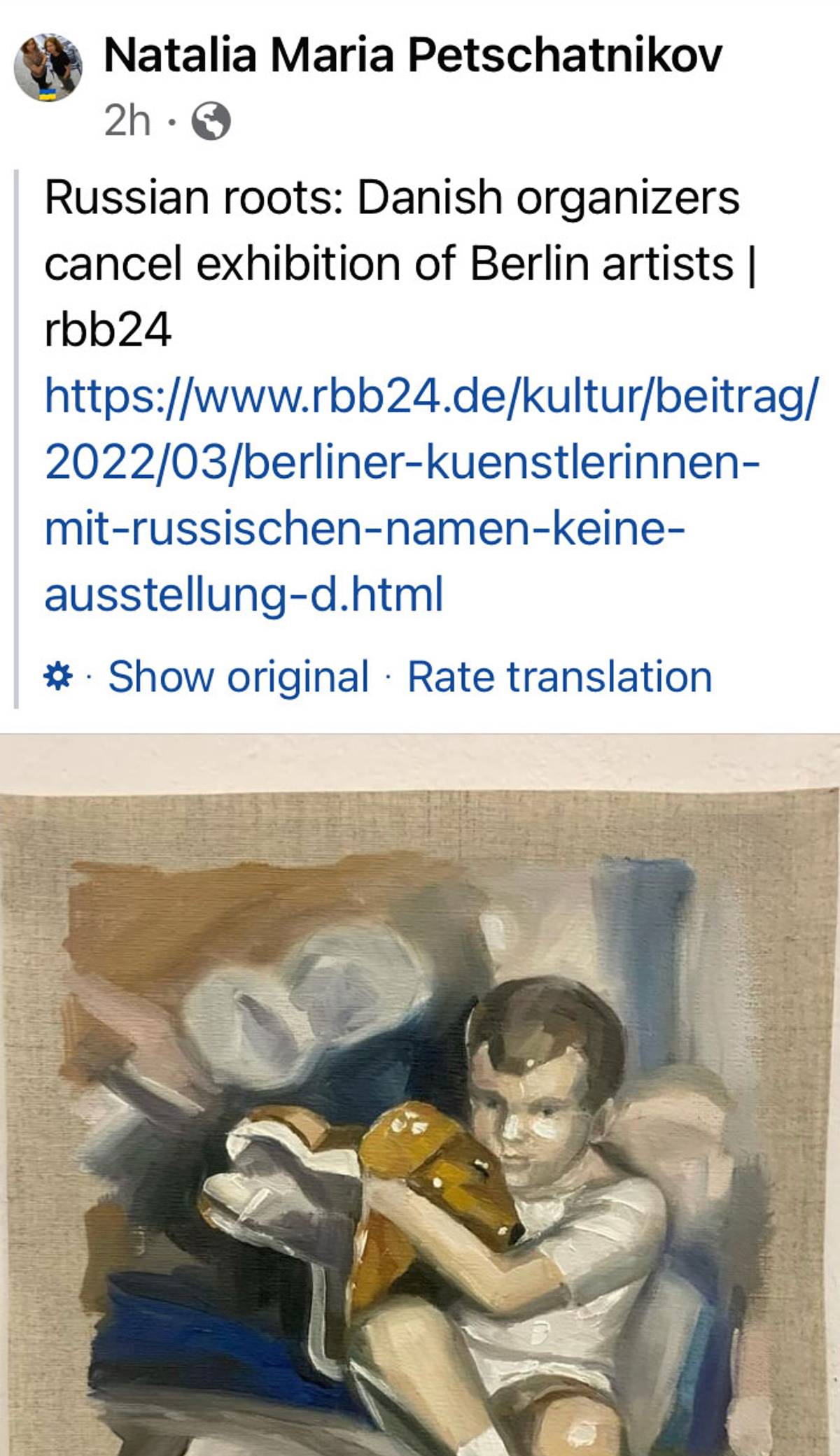
Among the international rejections of Russianness, three have given me the most pause. The University of Milano-Bicocca canceled Paolo Nori’s Dostoevsky course. Amid an outcry of support for both the professor and the subject, the university proposed to restore the course under the condition that it also include a Ukrainian author. In Italy, where Russian studies have historically been a flourishing field, teachers and enthusiasts of Russian culture report troubling signs and sentiments of outright rejection. Emboldened by Denmark’s Minister of Culture Ane Halsboe-Jørgensen’s call to suspend cooperation with Russia, the city of Horsens pressured its art museum to cancel an exhibition by Natalia and Maria Petschatnikov, the Berlin-based, ex-Soviet immigrants who have been living in Germany since 1991. The artists’ mother is an ethnic Russian, their father Jewish, and they have criticized Putin and decried Russia’s war in Ukraine.
In the words of the Danish artist Helle Bolther Christensen, who protested the cancellation: “What if someone wants to remove all the great Russian artists, such as Marc Chagall and Kazimir Malevich, that are in Denmark’s state art collections, or the Russian icons and works of Russian folk art that hang at the National Museum? […] Should one perhaps also [remove] the bust of the great Russian author Dostoevsky from the Assistens Cemetery in Copenhagen?”
Most extreme, however, have been the bans by Polish festivals, orchestras, and radio of performers and composers with Russian origins and roots—and not just imperial (Mussorgsky) or Soviet (including Shostakovich, who had his share of trouble with Stalin’s regime), but also émigré (Stravinsky).
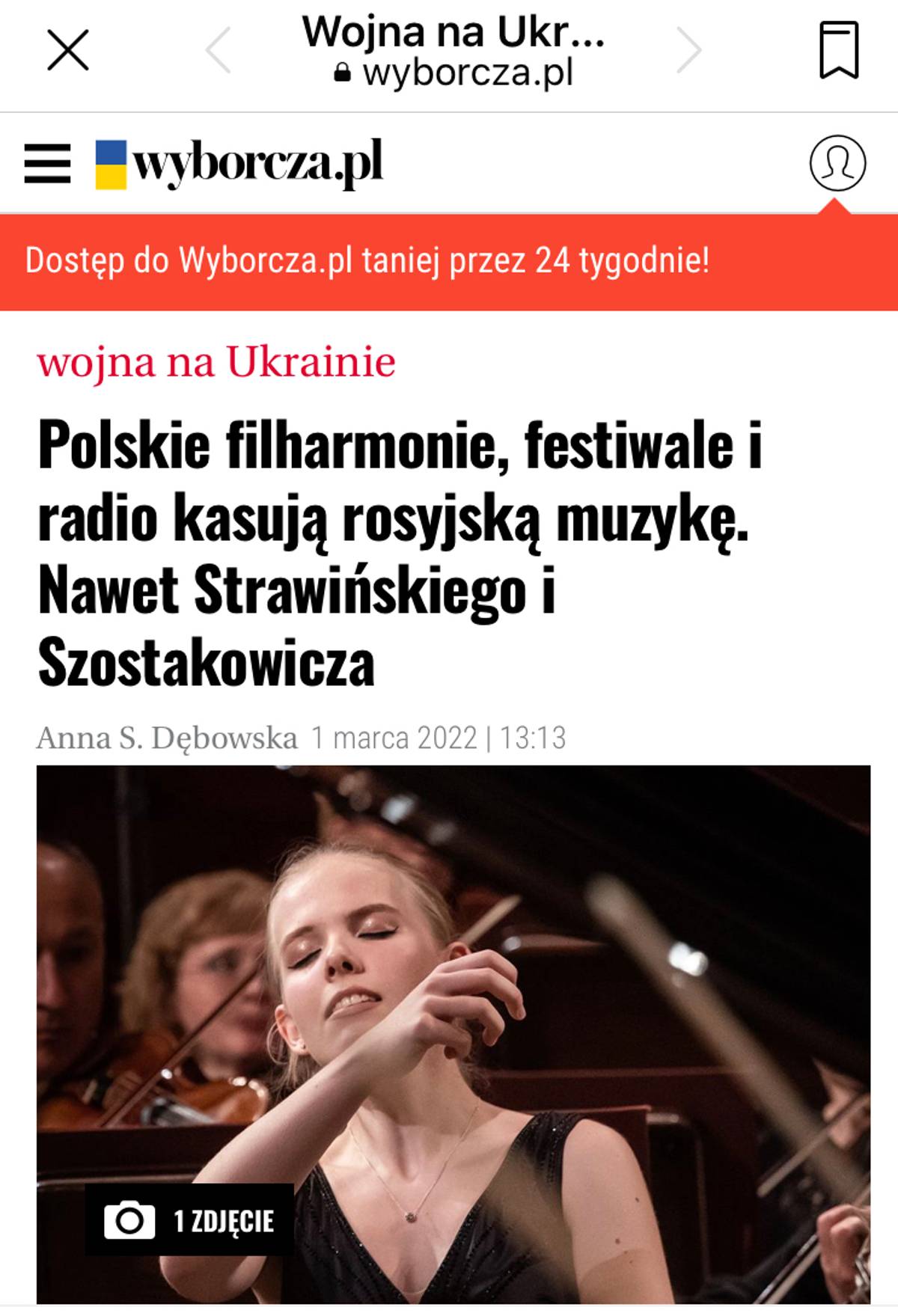
Do the cancellations of Russian composers bring to mind the opposition to performing the music by Wagner and Richard Strauss in Israel because of their perceived connection to Nazi Germany? In some ways, even more fascinating was the fevered removal from scheduled programs of Tchaikovsky’s “The 1812, Solemn Overture” by orchestras in Wales and Japan. This particular cancellation is ponderous because in the overture—for which Tchaikovsky himself did not care because he admittedly wrote it “without warmth and without love”—the sounds of “La Marseillaise” speak of Napoleon’s troops invading Russia in 1812, while the triumphalist finale employs the tune of “God Save the Tsar.” If the overture was removed because of its military Russocentrism, why would the banishers not replace it with another, shorter orchestral Tchaikovsky piece—“Capriccio Italien,” “Francesca da Rimini,” or “Romeo and Juliet”?
In today’s environment, it is not easy to interrogate the boycotts and cancellations of Russianness without feeling as though one unwittingly commits or enables apologism. Is it so surprising that while scores of academics specializing in Russia and the former USSR have vociferously condemned Putin’s invasion, only a small number of Russia specialists have publicly objected to “the cancellation of Russian culture” (as Gary Saul Morson adroitly called it in a recent cri de coeur)? Is it so perplexing that few Russian émigré scholars and public intellectuals have openly spoken against the boycotts? At the same time, some expatriates have publicly enacted performances of Russia-execration. The Russian American Tablet columnist Vladislav Davidzon, who was born in Tashkent and lived in Moscow as a child—and who has bravely reported on the war from Ukraine—burned his Russian passport in front of the Russian Embassy in Paris, where he lives. Speaking on CNN, Davidzon described the experience as “fantastically cathartic.”
Some of the decisions made in protest of Russia’s military aggression—and in solidarity with Ukraine and the suffering of her people—may strike one as more impulsive than thoughtful, more reactive than constructive. Some of the boycotts may even feel like acts of self-flagellation after two decades of complacency. However, various punitive and prohibitive responses to Putin’s war against Ukraine beg a series of bigger questions: How does the gamut of boycotts, rejections, and cancellations of things and folks Russian correlate with the rapidly forming landscape of economic and political sanctions against Putin’s Russia? Whom are the boycotts punishing—as opposed to satisfying the egos and urges of the banishers? What messages do the cancellations send both outside and inside Russia?
As regards the political sanctions, it appears that never before, neither during Nazism nor Stalinism, and certainly not during the post-Stalinist Soviet decades, has so much of the world come together so quickly and powerfully to blockade an oppressive great power. I remember the December 1979 Soviet invasion of Afghanistan particularly well because my parents and I became refuseniks in its smoldering shadow. The boycott of the 1980 Moscow Olympics by a group of U.S.-led nations now seems like child’s play as compared to the sheer force and dimensions of current sanctions against Russia. At the same time, years of U.S.-led sanctions have not destroyed the totalitarian and repressive regimes in Iran, North Korea, Venezuela, or Cuba. Can political sanctions bring down Russia’s despot?
Reflecting on the effects of the economic sanctions, Konstantin Sonin, formerly of the Higher School of Economics and now a professor at the University of Chicago, commented in Russian on his Facebook feed on March 12, 2022, (all translations my own): “Of course, sanctions—and the entire economic crisis caused by Russia’s invasion of Ukraine—hits the poorer half of the population the hardest, and among the poor it affects the poorest the most.” The closing of 850 McDonald’s restaurants and 130 Starbucks stores in Russia may have sent a loud message. But it has also taken away jobs from ordinary people who need them to survive, and especially now. That Russia’s population, and especially its poorer segments, has been affected by the economic sanctions is becoming increasingly apparent, for instance, with the price hikes and dearth of Western-made medications. Some of the American pharmaceutical manufacturers in Russia have refused to close shop, citing humanitarian concerns.
As we regard the landscape of sanctions, boycotts, and cancellations, it is crucial to turn to experts who fled Russia during the war or are still unafraid to speak from Russia, where the Duma recently passed a law imposing jail terms of up to 15 years for what is called “disseminating ‘fake’ news” (in essence, speaking truthfully about Russia’s war in Ukraine) and penalties for public calls for sanctions against Russia.
On March 21, 2022, I spoke to N.N., a former professor of cultural studies (a discipline about to be canned in Russia) who grew up in a Jewish Russian family. N.N. escaped from Russia in the early weeks of the war and did not want his name revealed. He told me in a Russian-language interview that he holds a negative opinion of the totality of the boycotts: “I support economic sanctions against companies and institutions that constitute a foundation of Putin’s regime. Yet I believe that the rejection of Russia’s private citizens only worsens the position of those who fled Putin’s neofascist regime. The rejection of Russian citizens and of Russian culture was dictated by emotions, by wrath and indignation, to be more precise. Such a rejection also stems, to a significant degree, from a lack of understanding of the fact that after 2017-18, and especially during the pandemic, Russia’s citizens have been nearly deprived of the opportunity to protest in public.”
In the early days of the war in Ukraine, only a handful of American voices warned about the dangers of what Tablet senior writer Jacob Siegel described as “a minor orgy of anti-Russian bigotry” in the United States. Siegel was among the lone sober voices to distinguish between actions against Putin’s regime and reactions against everything and everyone Russian. These voices are slowly growing stronger, even as Russia’s troops continue to commit unspeakable acts in Ukraine.
This, in turn, brings me to the notorious case of soprano Anna Netrebko and her banishment from the Metropolitan Opera in New York and other venues, and, most recently, of her being dropped by Center Stage Artist Management. The Netrebko case has been covered in tandem with the dismissal of the conductor Valery Gergiev (who is an Ossetian rather than an ethnic Russian), a Putin loyalist and a ranking member of Putin’s establishment. Gergiev is a general without uniform in Putin’s cultural service, and I see his boycott as justified. The Netrebko story strikes me as distinctly different. It bothers me not only because I think Netrebko’s voice is magnificent (the best Violetta I have ever heard!), and not just because it is a loss for our opera scene. To quote Alex Ross, The New Yorker’s music critic, “[t]he notion that every Russian should have to repudiate Putin before being allowed to perform in America or Europe is grim.”
The Netrebko case touches a number of raw nerves in American political history and in our foundational democratic and constitutional principles. Netrebko voiced her opposition to the war in Ukraine but did not—even though her career was at stake—condemn Putin’s regime. When has the expectation that artists, performers, intellectuals, and academics of Russian origin should engage in public political rituals in order to justify their professional status become the new normal in American society? In the words of Siegel, “[t]he notion that individuals should have their employment conditioned on the actions of a foreign government, or their willingness to denounce those actions, is frankly gross and authoritarian—the kind of thing I was raised to believe happened in Russia, not the United States.”
The New Republic writer Matt Ford struck a similar chord when he emphasized that speaking out can be simultaneously daring and self-destructive: “If Russians freely want to denounce Putin and his war, their courage for doing so should be praised and celebrated. But I’m uncomfortable with demanding that citizens of an authoritarian country must denounce a regime that is more than willing to kill those who criticize it, even if they live overseas.”
The dual expectation of denouncing Russia’s authoritarian ruler and pledging allegiance to the boycott of Russia is grotesquely undemocratic. It doubly reeks of Stalinism and McCarthyism. It also teeters alarmingly on the verge of violating basic freedom of speech and—if the “Russians” in question are professors and academics—endangers academic freedom.
The dual expectation of denouncing Russia’s authoritarian ruler and pledging allegiance to the boycott of Russia is grotesquely undemocratic.
Associating all or most Russians with Putin is no less absurd than associating all or most Germans and Austrians with Hitler—and yet associations of Russianness with Soviet totalitarianism and Cold War politics are deeply ingrained in the American psyche and popular culture. The modes vary, from the comedic (Norman Jewison’s 1966 charming film The Russians Are Coming, the Russians Are Coming, about a Soviet submarine running aground near a New England coastal community) to the sardonic (the nasty 1983 PBS documentary The Russians Are Here about Soviet immigrants in America); the stereotypical lens endures.
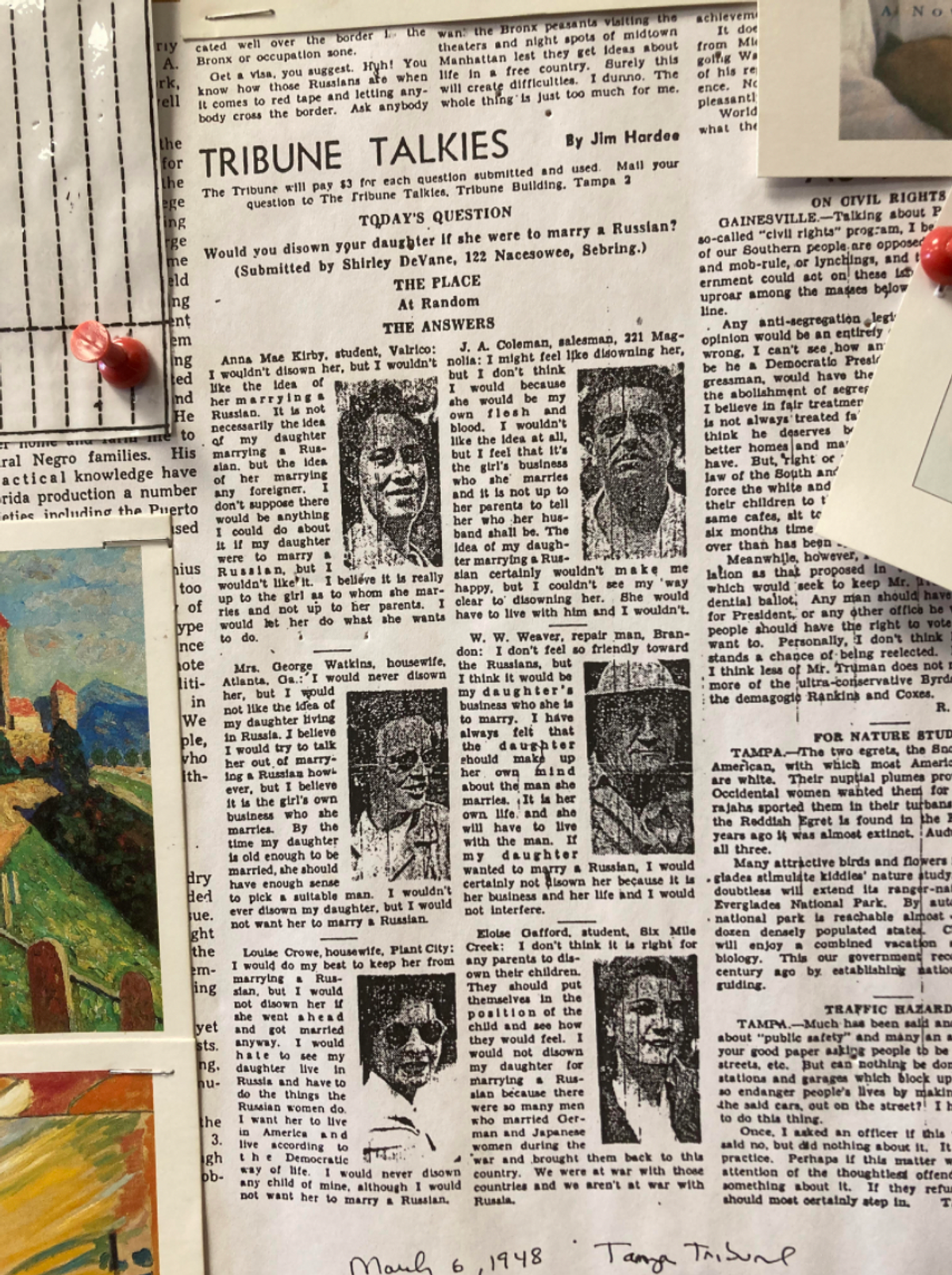
Pinned on my office door at Boston College is a copy of an article from The Tampa Tribune on March 7, 1948: “Tribune Talkies […] Today’s question: ‘Would you disown your daughter if she were to marry a Russian? (Submitted by Shirley DeVane […]).” Printed below the question are replies by six Floridians. Anna Mae Kirby, a student, stated: “I wouldn’t disown her, but I wouldn’t like the idea of her marrying a Russian.” Mrs. George Watkins, a housewife, explained her position: “I would never disown her, but I would not like the idea of my daughter living in Russia.” Louise Crowe, also a housewife, said: “I would do my best to keep her from marrying a Russian, but I would not disown her […] I would hate to see my daughter live in Russia and do the things the Russian women do.” J.A. Coleman, a salesman, answered the following way: “I might feel like disowning her, but I don’t think I would because she would be my own flesh and blood.” W.W. Weaver, a repairman, gave this response: “I don’t feel so friendly toward the Russians, but I think it would be my daughter’s business who she is to marry.” Eloise Gafford, a student, offered the only divergent perspective: “I would not disown my daughter for marrying a Russian because there were many men who married German and Japanese women during the war and brought them back to this country. We were at war with those countries, and we aren’t at war with Russia.”
I sometimes share this piece of postwar Americana with my students as we speak of the Cold War and U.S.-Soviet relations, and it so happens that as of this writing, students in my “20th-Century Russian Literature” course are learning about the late 1940s and early 1950s, specifically late Stalinism and the anti-cosmopolitan campaign. It would seem that since 1948 the perception of “Russianness” in the American mainstream has changed. Specifically, the great outflux of Soviet Jews in the 1970s to 1990s has altered the fabric of many American communities, especially in larger American cities. Soviet (Russian) expatriates who came to America in the 1970s have influenced our cultural and intellectual life in many profound ways—think of Joseph Brodsky, the first nonnative speaker of English to become U.S. poet laureate, or the dancer Mikhail Baryshnikov, who even got to play a version of himself vis-à-vis Sarah Jessica Parker’s Carrie Bradford in Sex and the City. Children of Russian-speaking Soviet immigrants, notably Sergey Brin of Google and Max Levchin of PayPal, have played a transformative role in the field of information technology. Does Putin’s war in Ukraine cast a dirty, compromising shadow over everyone in America who defines themselves or may be defined as “Russian” by origin, culture, language, or heritage?
The boycotts of Russianness are about much more than the war in Ukraine. They are also about the ghosts of the Cold War, specters of the Soviet Empire, and an accumulated resentment of what the West has been habitually referring to as “the Russians.” The Western world (which now includes the former Eastern and Central Europe and which Ukraine seeks to be a part) has unfinished fights with Russia, the heir apparent to the Soviet Union. Yet parts of the former Soviet Union and the Soviet bloc have plenty of good reasons to be vigilant about Russian domination that are not just about history or memory. While the flareup of anti-Russian sentiment is significant in America, it is more palpable in parts of Europe. And it is especially acute in those countries, where both the fear of Russian encroachment and the more recent memories of “Russian” domination feed upon residual layers of World War II history. Such is especially the case in the Baltic republics and in Poland, with their histories of Russian imperial domination and suppression of national selfhood. Now these societies are lashing out against things and people Russian. A well-meaning Polish colleague recently advised a Jewish professor of Russian studies at a Polish university to identify himself and his family as “originally from Kazakhstan.” Add to the mix the years of accumulated vexation with unbridled Russian wealth and spending abroad. I confess that I, too, have been guilty of a stereotypical depiction of the new—Putinesque—Russians abroad.
The term “Russian” is never simple or transparent, and examining it in the afterglow of Cold War politics makes for a challenging experience. In the Russian language, at least three elastic terms are distinguished: russkii, rossiiskii, and russkoiazychnyi. Russkii generically refers to ethnic or cultural Russian identity; rossiiskii to Russian national identity or citizenship, and russkoiazychnyi specifically to Russian linguistic identity. To put it in a demographic perspective, while the term rossiiskii refers to all of the 146 million citizens of the Russian Federation, the term russkii applies to about 115 million ethnic Russians. At the same time, around 1 million people in the United States and Canada, and another million people in Israel, could be variously defined or described as Russian and Russophone. For instance, a Jew formerly of Kyiv and now of Queens, New York, an American citizen, and a bilingual poet who writes and publishes in English and Russian, could be called russkii (Russian) by culture and roots, russkoiazychnyi (Russophone), but not rossiiskii (of the Russian state or land) by citizenship or belonging. These distinctions are largely lost in translation and unapparent to those who do not have a background in Slavic languages or Russian imperial and Soviet history. This brings me to what is probably the most tender part of this essay.
On March 16, 2022, Iryna Podolyak, former deputy minister of culture of Ukraine, contributed an essay to Visegrad Insight, one of the arms of the Warsaw-based Res Publica Foundation. Podolyak’s essay, published in an authorized English translation from Ukrainian, bears the title “Why Russians Are to Blame for Putin.” It contains clues to understanding the current climate of boycotting not just Putin’s Russia but ideational parameters of Russianness:
Good Russians do not exist. Even if they have had a different nationality for decades somewhere in Germany, France, Israel or Australia. […]
If they are worried about Russia’s fate, let them go there and change their fate, die for it, just as our people die for Ukraine. Instead, they describe in dramatic voices the severed limbs of our children, the shattered eyes of our women or the cold smiles of our army.
In every country in the West and East you must reject the money of those with Russian passports, otherwise, it is only a matter of time before we hear their slogans about ‘Russischer Lebensraum’ preached from the beaches of Dubai or Biarritz. Good Russians do not exist.
They have not been born yet.
On March 21, I got in touch with Podolyak via Messenger, and asked whether her essay could be conceived as hateful or, perhaps, intolerant toward some 8 million ethnic Russian citizens of Ukraine, a majority of whom are Ukrainian patriots now fighting in Ukraine’s army and regional defense against the invasion of Russia’s armed forces? She fired back in English:
“Ethnicity does not matter, and I do not see it as a defining feature in this text. In the 21st century, attention to the ethnic origin of human being is archaism. For me, ‘Russians’ in this context are ‘Russian citizens,’ holders of Russian passports, who ‘elected’ Putin in all ‘elections,’ who adopt and accept his domestic and foreign policies, who do not fight for their rights or for human rights in general. […] If you carefully study all the statements of the Russian ‘liberals,’ you will see the imperial flair in all their speeches. It is a political nation whose source of existence is non-freedom. And I do not mention in any way in the text Ukrainians who, for one reason or another, speak Russian. I know the reasons, and there is an understanding that this will change in 5-10 years calmly and without pressure. I am glad that I clarified my position, because I am the last person in Ukraine who can be suspected of xenophobia.”
In Podolyak’s argument, “Russians” are not an ethnicity, nor are they exactly an identity. All of her “Russians” wear the zoster of Putinism, and it is not clear if they can ever remove it from their bodies and minds. As I was mulling our exchange, I thought of the article “Kill!” by Ilya Ehrenburg, an important Jewish Russian writer and arguably the principal Soviet anti-Nazi polemicist of the wartime years. “Kill!” appeared on July 24, 1942, in Red Star, the main newspaper of the Red Army, as the armies of the Third Reich pushed toward the Caucasus and Stalingrad. An internationalist and a cosmopolitan formed and shaped by the Parisian avant-garde, Ehrenburg sensed that the Soviet people needed a visceral patriotic message. His famous “Kill a German!” rhetoric resounded across the vast Soviet Union, which had about a million Volga Germans and other ethnic German citizens. (The collective punishment of ethnic Germans in the USSR was a close parallel to the wartime treatment of Japanese Americans.)
As I processed Podolyak’s thoughts on Russianness, I stumbled upon a recording shared on her Facebook page. In the recording, a young Ukrainian performer sings while accompanying herself on the keyboard. In the chorus, she sings about “the corpse of a Russian [trup moskalya]” that will be mixed with “our native [Ukrainian] soil.” Referring to the invading soldiers sent to Ukraine by Putin’s regime—soldiers who, under mandatory draft for men, could be not only ethnic Russians but Yakuts, Chechens, or representatives of Russia’s many other ethnic groups—the song employs the slur moskal, an unofficial ethnonym for Russians in Ukrainian, Polish, and Belarusian. (The term is etymologically related to Moscow and Muscovy.) I played this song of Ukrainian rage, and then I turned on NPR and listened to a news dispatch by Jason Beaubien, filed from Lviv. In it, the seasoned American reporter spoke of “devastating losses for the Russians” and “this number of deaths for the Russians”—not the Russian troops or the troops of the Russian Federation, but “the Russians.” And I thought to myself that the language that elides those who bear the many varieties and permutations of Russian identities has got to change. It is obsolete, outdated, and yes, intolerant.
The bloody war in Ukraine is in its second month. Putin’s regime continues to commit atrocities while simultaneously crushing what remains of domestic opposition. One of the hangman’s jokes to emerge recently from Russia is about Putin’s order to demolish every fifth column in the Moscow metro—a play on its elaborate architecture and on the expression “fifth column,” which goes back to the Spanish Civil War and which Putin’s propaganda now employs in reference to citizens of Russia who voice criticism of the war in Ukraine. Morbid jokes of this particular slant have their origins in the brief period of 1982-84 when Yuri Andropov, former KGB boss, was the Soviet leader. I remember one such joke from my penultimate year of high school, about Andropov inspecting new buildings in downtown Moscow. “Comrade Andropov,” one of his lackeys says, “and this is the new Jewish chamber theater.” Andropov turns his turtle head and asks: “How many chambers?” In 1975, Putin joined the ranks of the Andropov-run KGB, where he was programmed to control Russia’s future.
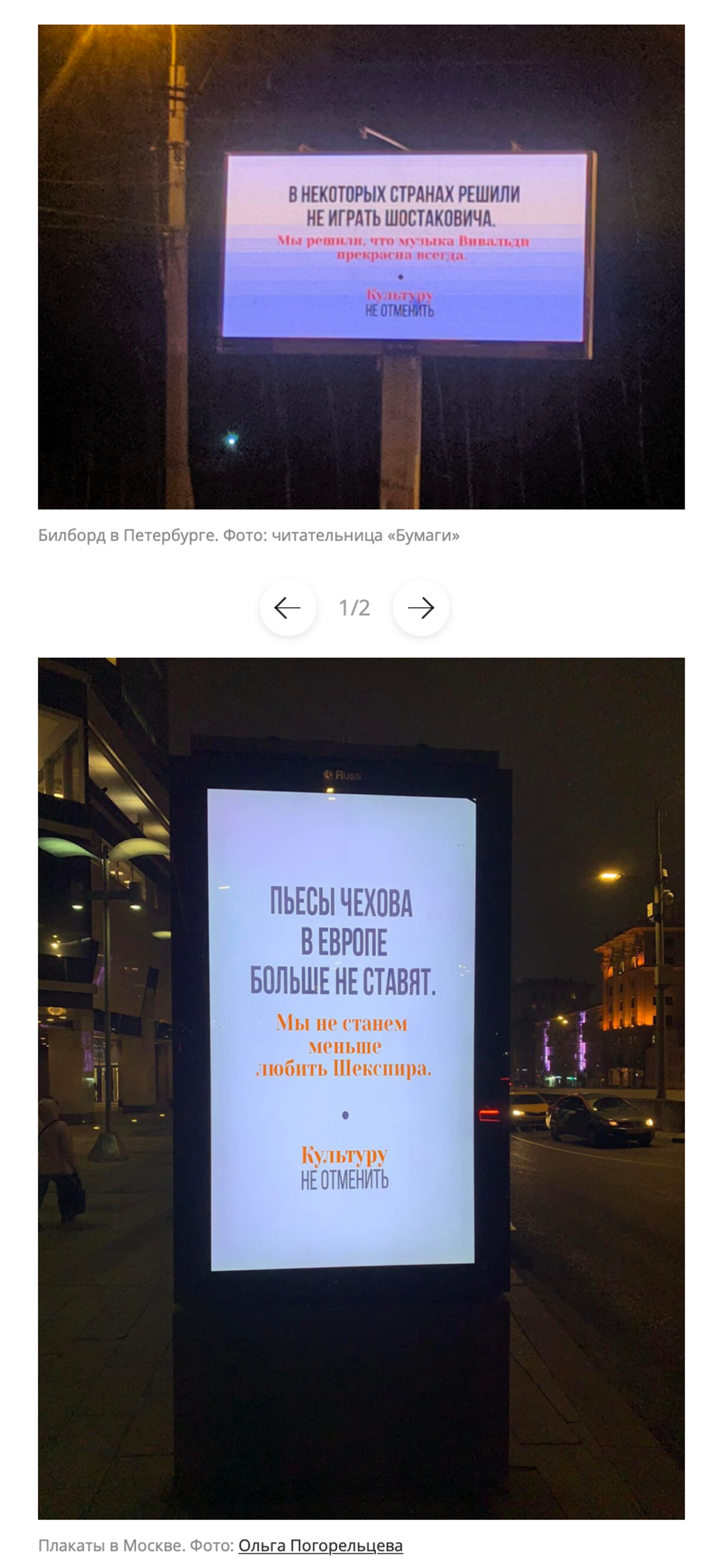
How does the future look to “the Russians” now living under sanctions and boycotts, in the polar night of a growing isolation? I put this and other related questions to my friend P.P., a St. Petersburg-based museum curator and poet. I met him in the late 2000s, when I used to make regular trips to Russia—to lecture and conduct research, and when the majority of the country’s citizens, including the intelligentsia and the new moneyed class, did not think that Putin had highjacked their destinies. Even though P.P., who is in his late 30s with a wife and one child, was prepared for me to use his real name, I concealed it for fear of reprisals on him and his family. P.P. had previously shared with me that he had been unable to write or think clearly since the start of the invasion of Ukraine, and I told him that I had been unable to sleep. We were talking of the way Russia’s putative dictator uses Western sanctions and boycotts as sham evidence that Russia is not fighting a war in Ukraine but supposedly defending itself, its land, its way of life and culture, from a blockade by Western powers. We also talked about the way Russia’s propaganda machine fashions Putin as a defender of Russianness.
In beautifully articulate Russian, P.P. told me: “Dictators in and of themselves do not own culture, they take culture captive, declare it to be their own, pervert it. And one could say that to some extent, in perverting culture, they weaponize it. Not letting the dictators do that is also a type of sanction, a reaction of a civilized world. From here I am troubled by the future. Cultural isolation is a terrifying thing. Especially so because children must have access to something else, something to nourish them, or else new generations of deceived marching idiots will be reproduced.”
In Moscow and St. Petersburg, the “marching idiots,” of whom my friend spoke with such chilling Orwellian clarity, are currently being exposed to billboards and posters with slogans such as “They no longer stage Chekhov in Europe. We shall not love Shakespeare any less. Culture shall not be canceled.” Putin’s propaganda desperately wants its subjects to believe that they are protectors of culture. It is imperative that we in the West not add smoke to this propaganda screen. We should call Putin’s bluff while also remaining open and receptive to Russian intellectual and creative culture. Rather than face boycotts, shouldn’t Russian culture abroad serve as both an antidote to Putin’s lethal rancor and an interpretive dictionary of Russia’s past and present disasters?
Consider a bit of alternative history. It’s August 1940, the second month of the Battle of Britain. The United States is offering economic, military, and political assistance to Great Britain, now alone fighting Nazi Germany. Yet the United States would not enter the war with Nazi Germany for another sixteen months. Now imagine a scenario, under which American government institutions, colleges and universities, cultural venues, Hollywood, the publishing industry, the music and theater scene, all begin to boycott or banish expatriate intellectuals, both Jewish and not Jewish, who have origins in Germany or Austria or have fled the Third Reich. Their list would have included Hannah Arendt, Marlene Dietrich, Hanns Eisler, Lion Feuchtwanger, Thomas Mann, Otto Preminger, Douglas Sirk, and Bruno Walter.
That is, fortunately, not what happened. But it’s useful to think about when considering the tens of thousands of individuals and families who have already escaped or are trying to escape from the prison that Putin has made Russia. The latest, fifth wave of emigration from Russia is only beginning to receive attention. The Soviet-born émigré scholar and Tablet contributor Izabella Tabarovsky recently stressed the importance of those whom she termed “Russia’s new exiles.” Ilya Somin, a George Mason University law professor who was born in Leningrad, believes that “expanded Russian emigration to the West would be a tremendous moral victory for the United States and other liberal democracies.”
Not all of these émigrés are intellectuals, artists, or performers. Not all of them are outspoken critics of Putin’s regime. Many are survivalists who see no future in what Russia has become over the first month of the war in Ukraine. They have fled Russia with their children and pets, with suitcases and laptops in tow, perhaps even less certain of the future than those who left after the fall of the Soviet Union. The newest émigrés got on a flight to Yerevan, Istanbul, Belgrade, Tel Aviv or wherever else planes still take escapees out of Russia. And now they, too, need our support instead of suspicion and scorn. Let us not reject them.
Maxim D. Shrayer is a bilingual author and a professor at Boston College. He was born in Moscow and emigrated in 1987. His recent books include A Russian Immigrant: Three Novellas and Immigrant Baggage, a memoir. Shrayer’s new collection of poetry, Kinship, will be published in April 2024.